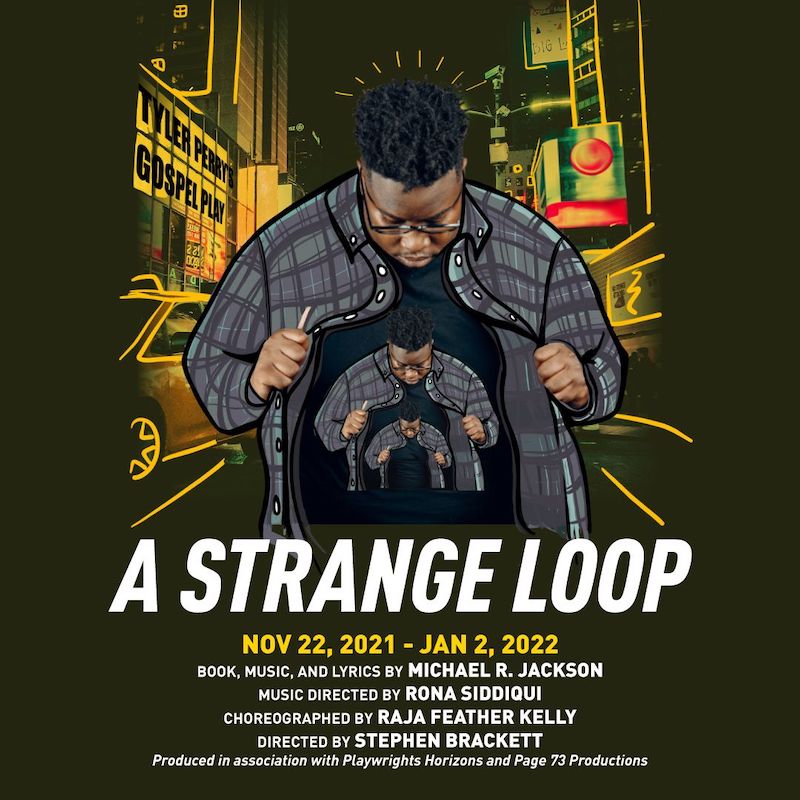Stopping off at Woolly Mammoth on its way to Broadway — following an off-Broadway run that won it the Pulitzer Prize for Drama — Michael R. Jackson’s extravagantly original musical, A Strange Loop, is in a class of smash hits by itself. I’ve been trying to think of anything else that comes close to resembling it, and I can’t. In thematic dimensionality and depth, raw candor, and knockout meta-theatricality, A Strange Loop is beyond compare.
At the show’s core is the unrelentingly self-referential story of a fat Black queer cis man trying to write a musical about a fat Black queer cis man trying to write a musical about…and so on. At the center of this funhouse of mirrors is a 25-year-old semi-autobiographical character named Usher (who also works as an usher to support his writing aspirations). Although gifted with scathing wit and luscious musicality, he is awash in self-loathing and sexual ambivalence and “starved for Black affirmation and affection.” An agonized auteur, he has written into the script six actors to play (and project) his Thoughts. Assuming a swirling multiplicity of roles, they variously torment him with self-doubt and taunt him for his artistic and sexual failure.
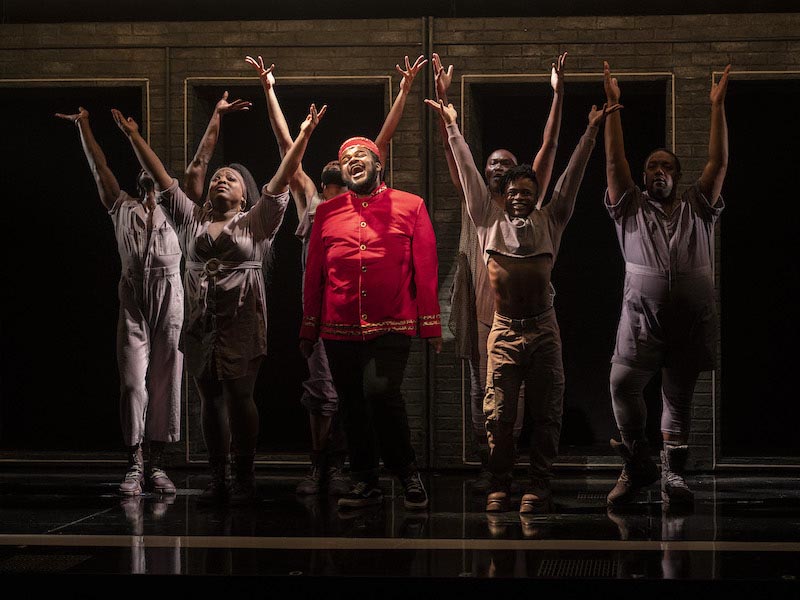
The wonder of the show is that this ruthlessly self-lacerating lead — played by the phenomenally talented and charismatic Jaquel Spivey, making his professional debut — becomes easily one of the most adorably complex characters who might ever win you over onstage. Within minutes you begin to root for him. The more his Thoughts dump on him, the more his Bible-thumping parents deride him, the more desperate and demeaning his sex life, the more lovable he becomes. And that is just a glint of the genius in this musical.
Precisely in his specificity, Usher becomes instantly empathetically resonant. Plainly his struggle to own a sense of self he can embrace without disgrace is embedded in social particulars and signifiers—his BMI, his Blackness, his quest for dick. (Be advised that A Strange Loop does not hold back in graphic detail about some gay male sex practices.) And yet in what has to be one of musical theater’s greatest dramatic reversals, Usher’s recircling solipsism of longing to feel worthy of someone’s love comes to seem essentially like everyone else’s too.
Strangely, we are looped in.
The set by Arnulfo Maldonado starts out a gray stone wall with six doorways in which appear the six Thoughts, who are costumed by Montana Levi Blanco in a mix and mashup of neutral work clothes and workout togs. Under a rumpled plaid shirt, Usher himself wears his politics on his black T-shirt (with a nod to bell hooks). What begins drab eventually turns fab, with eye-popping lighting effects by Jennifer Schriever plus a shape-shifting set that culminates in a stunning scenic reveal: for a brain-blasting gospel musical that Usher writes to satisfy his homophobic folks.
The extraordinary ensemble — L Morgan Lee (Thought 1), James Jackson, Jr. (Thought 2), John-Michael Lyles (Thought 3), John-Andrew Morrison (Thought 4), Jason Veasey (Thought 5), Antwayn Hopper (Thought 6) — were all members of the off-Broadway original cast and are clearly at home in Usher’s distraught mental landscape. Their vibrant vocals (music direction by Rona Siddiqui) and vigorous choreography (by Raja Feather Kelly), combined with their countless character impersonations, make for a musical theater lover’s dream team.
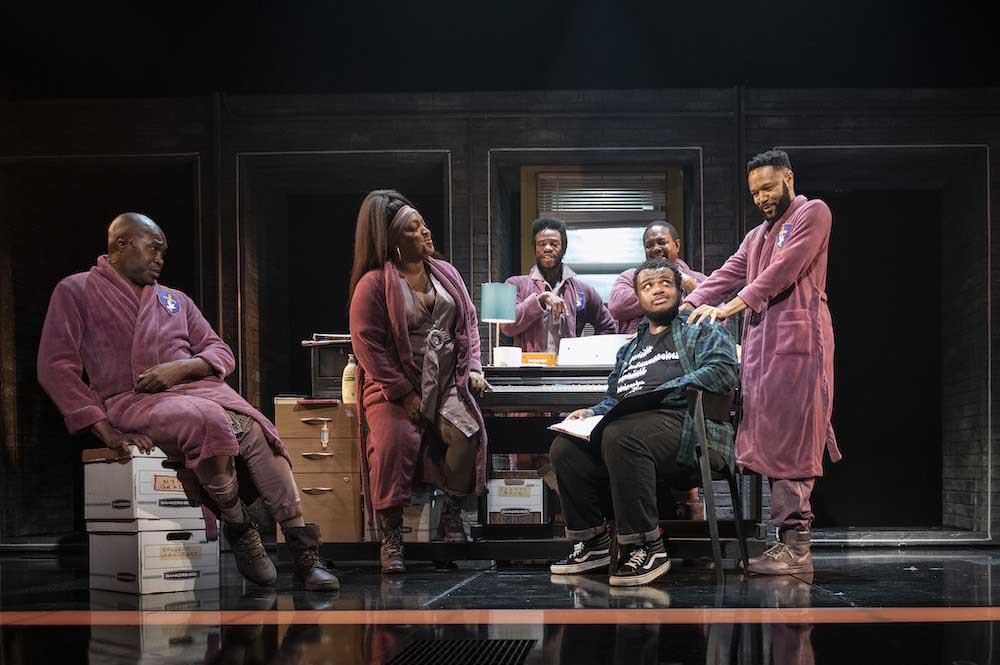
At one point all six Thoughts don dusty-rose robes emblazoned with a Christian cross to portray Usher’s mother. At another point, she is portrayed in a pink go-to-church dress by John Andrew Morrison singing “Periodically” — one of many show-stopping solo turns. The Thoughts’ dramatic fluidity and versatility sustain an astonishing support system for Spivey’s wrenching performance as Usher, whose solos and scenes alone on stage have breathtaking conviction.
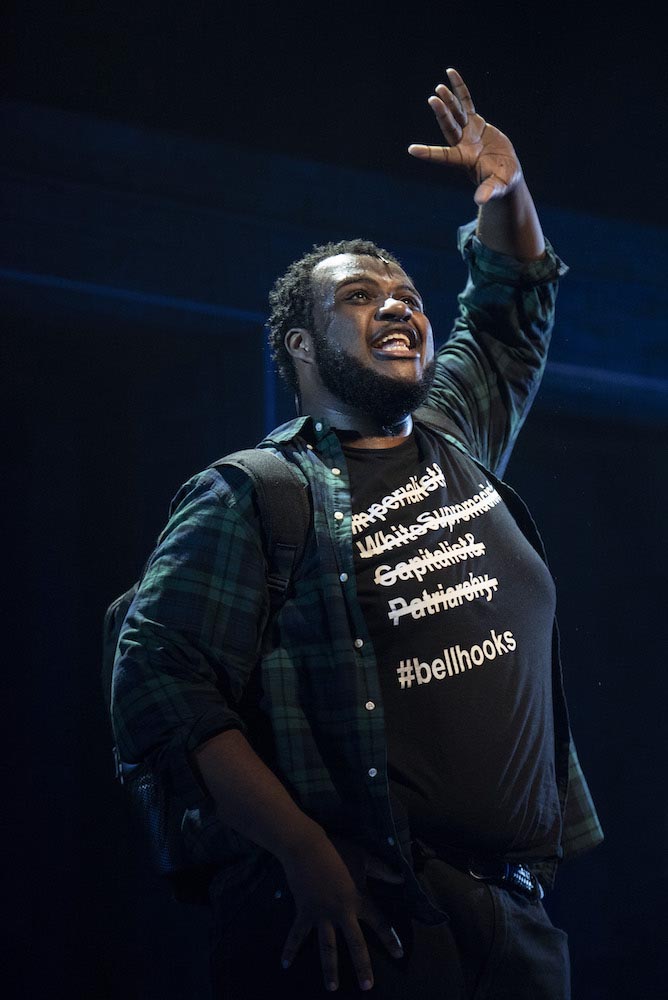
In addition to the plotline that concludes with Usher’s over-the-top-satirical gospel musical (“AIDS is God’s punishment” is the refrain), A Strange Loop features a haunting story arc about Usher’s sex life. Determined to get (as the script puts it) butt-fucked more often, he ventures into “Gayville,” where he faces app rejection (“Too Black. Too fat. Too fem”). Then (in a number called “Inwood Daddy”), an older white man on the down-low lures him into what turns out to be brutal anal intercourse as racist domination. What follows that hard-to-watch scene may be one of the most revelatory numbers ever in a Broadway-bound musical. It’s called “Boundaries”:
WHY DID I DO THAT?
DOWN ON MY HANDS AND KNEES?
WHY PLAY SUBMISSIVE?
WHAT ARE MY BOUNDARIES?
…
WHY DO I DO THIS?
BOW DOWN AND PEOPLE PLEASE
I CAN’T KNOW FREEDOM
WITHOUT CLEAR BOUNDARIES
The script, I hasten to add, is loaded with laughs; it whizzes by with like a zillion zingers, and Director Stephen Brackett paces the show brilliantly and hilariously. And yet savor those amazing moments when the laughs abruptly halt, as though the audience as one just got gobsmacked by a damn-that-was-deep truth.
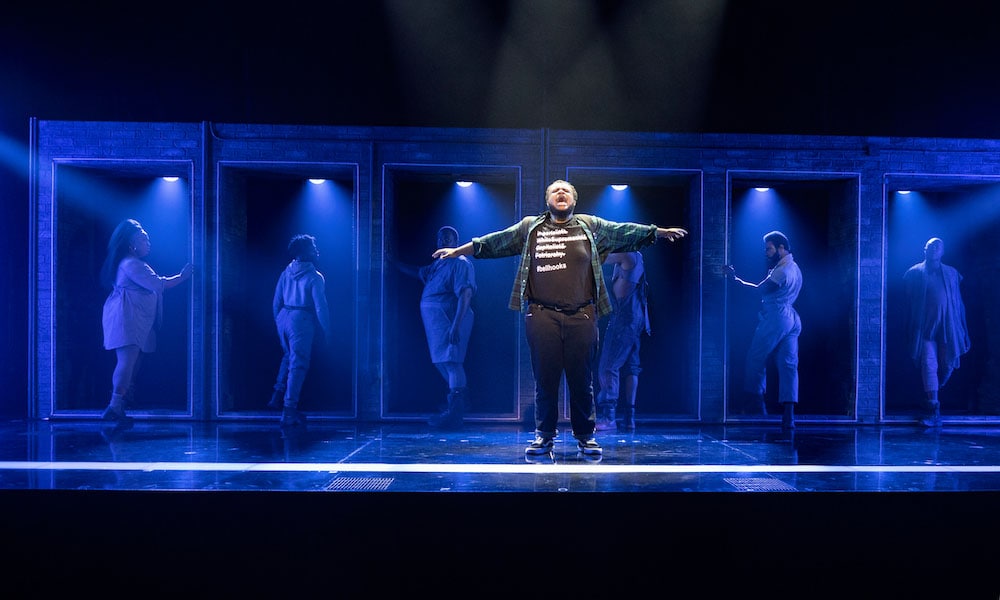
In a sense, A Strange Loop is a singular poet’s excavation of all the stuff that stands in the way of claiming the value of their first-person singular pronoun — their journey from self-loathing to self-respect. Many another theater artist has done autobiographical digging and come up with a work that lets us know them. A Strange Loop is in that rare category of painfully honest self-referential works that help us sense something unsaid about ourselves.
Running Time: Approximately one hour and 40 minutes with no intermission.
EXTENDED: A Strange Loop runs through January 9, 2022, at Woolly Mammoth Theatre Company, 641 D St NW, Washington, DC, with performances Tuesday to Friday at 8 pm; Saturday at 3 pm and 8 pm; and Sunday at 2 pm and 7 pm (except December 12, which features a 7 pm performance only); Monday, December 27 at 8 pm. Single tickets start at $32 and are available online, by phone at (202) 393-3939, and via email at [email protected]. Twenty-eight Pay-What-You-Will tickets are also available to every performance by selecting the PWYW seats and adjusting the ticket price. Patrons who are 30-years-old and younger may, at any time, purchase Section C tickets for $20 to any performance. There are also discounts available for educators, first responders, and active U.S. military personnel, spouses, and veterans. More information is available at woollymammoth.net.
COVID Safety: Entrance to any event at Woolly Mammoth will require proof of vaccination or, for those who are not vaccinated, proof of a negative COVID-19 PCR test taken within 72 hours of the event start time. Guests may show physical or digital proof of their health status. Masks must also be worn at all times while in the building.
A STRANGE LOOP
Book, music, and lyrics by Michael R. Jackson
Directed by Stephen Brackett
Choreographed by Raja Feather Kelly
Music directed by Rona Siddiqui
Produced in association with Playwrights Horizons and Page 73 Productions
CAST
Jaquel Spivey (Usher), L Morgan Lee (Thought 1), James Jackson, Jr. (Thought 2), John-Michael Lyles (Thought 3), John-Andrew Morrison (Thought 4), Jason Veasey (Thought 5), Antwayn Hopper (Thought 6), and Christopher Michael Richardson (Understudy for Usher and Thought 4).
CREATIVE TEAM
Scenic design by Arnulfo Maldonado, costume design by Montana Levi Blanco, lighting design by Jennifer Schriever, sound design by Drew Levy, hair/wig/makeup design by Cookie Jordan, vocal arrangements by Michael R. Jackson, intimacy choreography by Chelsea Pace, orchestrations by Charlie Rosen
MUSICIANS
Keyboard & Conductor: Rona Siddiqui
Keys/Guitar: Beth Callen
Bass: Max Murray
Drums: Erika Johnson
Reeds: Dana Gardner
Rehearsal Pianist & Stand-by Conductor: Marika Countouris
SEE ALSO:
Woolly Mammoth commits its ‘badass theater’ to accessibility
Schedule of accessible performances during the run of A Strange Loop
Open Captioned performances feature permanently visible, on-screen text description that displays dialogue, identifies speakers, and describes other relevant sounds.
Tuesday, December 7
Tuesday, December 14
Tuesday, December 21
Tuesday, December 28
ASL Interpreted performances feature interpreters placed inside the theatre who translate what the actors are saying and expressing to the audience.
Saturday, December 11 Matinee
Sunday, December 19 Matinee
Audio Described performances feature live narration interspersed with the actors’ dialogue used to provide information surrounding key visual elements.
Wednesday, December 15
Wednesday, December 29


